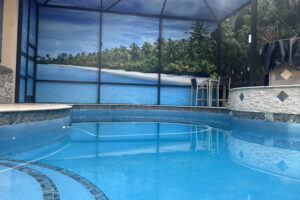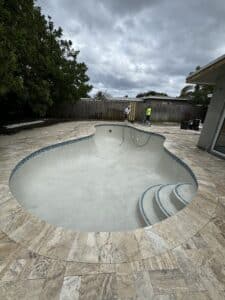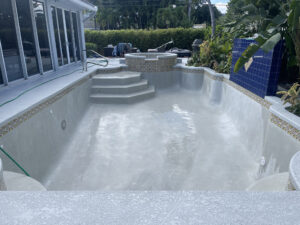Saltwater pools are popular for their soft water feel, low chlorine levels, and easier maintenance. But they come with their own set of challenges — especially when it comes to surface damage. Over time, salt can wear down your pool’s finish, leading to rough textures, corrosion, and staining. That’s why pool resurfacing for saltwater pools is one of the most effective ways to restore beauty and protect your investment.
How Saltwater Affects Pool Surfaces
Although saltwater is easier on your skin than traditional chlorine, it’s hard on your pool’s materials. Salt causes gradual damage to:
-
Plaster and pebble finishes (etching and pitting)
-
Metal fixtures like ladders and railings (rusting)
-
Natural stone or tile (staining and discoloration)
If left unaddressed, salt buildup can lead to expensive repairs or even structural damage. Pool resurfacing for saltwater pools helps stop this cycle by sealing and strengthening the surfaces before they degrade further.
Why Pool Resurfacing for Saltwater Pools Is Essential
Saltwater systems create a unique chemical environment that accelerates wear — especially in Florida’s hot, year-round climate. Resurfacing isn’t just a cosmetic upgrade; it directly addresses safety, performance, and water quality by:
-
Covering cracks and rough patches
-
Sealing materials against salt corrosion
-
Preventing algae growth in surface crevices
-
Improving swimmer comfort and visual appeal
Professional pool resurfacing in Jupiter includes selecting finishes designed to withstand salt exposure — extending the life of your pool and reducing future maintenance costs.
Best Finishes for Saltwater Pool Resurfacing
Not all surfaces are equal when it comes to saltwater durability. Here are a few top options to consider:
-
Quartz – Sleek, smooth, and moderately resistant to salt damage
-
Pebble – Highly durable and textured, ideal for saltwater systems
-
Glass bead – Visually striking, but more sensitive to imbalance
-
Salt-resistant coatings – An optional layer that adds protection regardless of finish
A knowledgeable provider of pool resurfacing for saltwater pools will help you choose the right material based on your goals, budget, and how often your pool is used.
What Happens If You Delay Resurfacing?
Ignoring signs of salt damage — like rough areas, discoloration, or exposed aggregate — can lead to:
-
Higher risk of injury from sharp or abrasive surfaces
-
Algae and bacteria growth in cracks
-
Lower property value due to poor pool appearance
-
Expensive repairs when damage spreads deeper
That’s why early intervention and routine pool maintenance in Jupiter are so important, especially for saltwater pool owners.
How to Extend the Life of Your Saltwater Pool Surface
To get the most out of your resurfaced pool:
-
Rinse off metal fixtures after heavy use
-
Choose durable, salt-tolerant materials
-
Seal vulnerable surfaces as needed
-
Maintain balanced chemistry and salt levels
-
Schedule professional inspections and cleanings
Working with a local expert in pool resurfacing for saltwater pools means you’ll get tailored recommendations that work for Florida’s unique climate.
Call Finn’s Pool Services for Saltwater Pool Resurfacing
If your saltwater pool is starting to show signs of surface wear, don’t wait until small problems become expensive repairs. Our team specializes in pool resurfacing for saltwater pools — using high-performance materials that are built to last. We also offer full pool repair and maintenance in Jupiter to keep your system running smoothly.
Contact Finn’s Pool Services today for expert salt water pool resurfacing in Jupiter—and let’s restore your pool with a safe, durable finish made for saltwater environments.
- Phone: 561-702-6351
- Email: [email protected]
-
Address: 1109 Old Okeechobee Rd. #2
West Palm Beach, FL 33401 - Mon – Fri: 8:00 AM – 6:00 PM
- Sat & Sun: 9:30 AM – 4:00 PM




